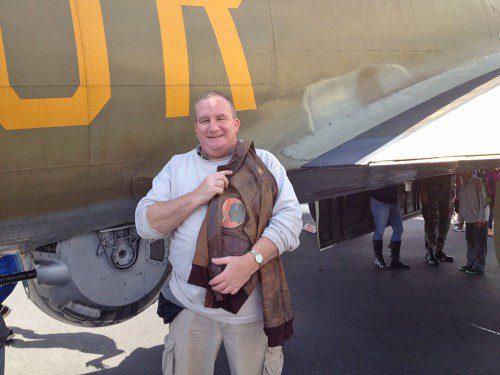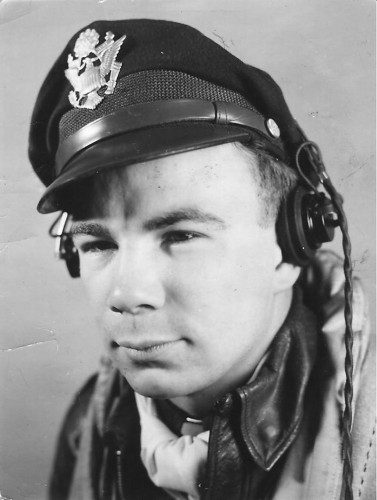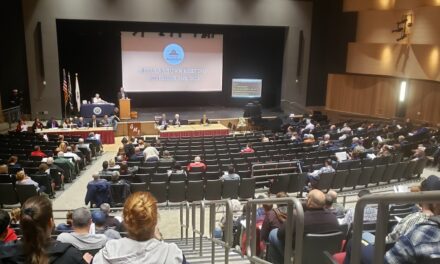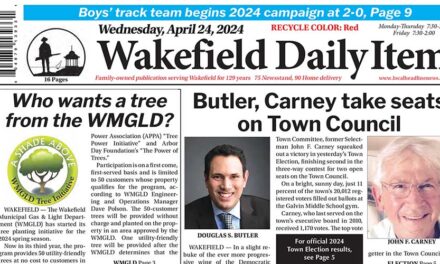By GAIL LOWE

GORDON McRAE’S son Andrew realized a dream to fly in his father’s navigator position in a Boeing B-17 Flying Fortress with the actual bomber jacket his father wore.
WAKEFIELD — Today, the Daily Item honors all veterans who have fought on foreign soil to protect the freedom of this magnificent country we call America. Today, we honor those we’ve known and loved. We’ve singled out one Wakefield hero who kept his story largely to himself. Until now.
Images from the past . . .
The sepia images beg to tell the story; so do aged documents marked “SECRET.” They are all part of the story of longtime Wakefield resident and former U.S. Army Air Corps member Gordon McRae. Letters he wrote to his older sister Bess relay his struggles, his hopes and his determination. These artifacts, treasured by Gordon’s middle son Andrew, were recently shared with an Item staff writer so his father’s story — Andrew’s hero and one of Wakefield’s, too — can be told.
The letters begin . . .
Dear Bess,
My orders arrived today, just before your letter came. Maybe it will make you feel better to know that your letter helped a great deal.
You see, I have always marked Bombardier in the preference sheets as my second choice and put Navigator as last of all.
Now I’m going to Navigation school to have mathematics crammed in my head until I’m dizzy. From the day I was first sworn in, I have dreaded being classified for Navigation school. Now when I thought I was in the clear, I’m in the spot I least wanted.
The letter from Gordon to Bess, dated Oct. 28, 1943 and posted from Augusta, Ga., is yellowed with age, but its message remains clear. His goal was to fly during the war.

ALTOGETHER, Gordon McRae flew 35 missions during WW II, his first on Sept. 19, 1944 and his last on Feb. 19, 1945, making good on his word to his sister Bess.
People who knew Gordon McRae will remember him as assistant principal at the old Atwell Junior High School and head of the GED program at the high school until his death in 1986. They will also remember him as a playwright, colleague, friend, neighbor, father and brother. Now, they can remember him for even more.
In another letter to his beloved sister, Gordon continued to express disappointment about not being approved as a pilot and being assigned instead to Navigation school.
After continuously flying for months the air is so much in your blood that it becomes a part of you. In Navigation school I shall probably be so busy working that I won’t have time to be conscious of that dull ache and the urge to hop up into the sky. I’ll just have to find peace of mind in hard work . . . nothing is going to stop me from flying later on.
Gordon wrote about his determination in subsequent letters, a stack three inches thick, to the woman he considered his second mother and in time he became a navigator in the U.S. Army Air Corps.
Altogether, he flew 35 missions during World War II, his first on Sept. 19, 1944 and his last on Feb. 19, 1945, making good on his word to Bess.
After spending two years at Salem Teacher’s College (now Salem State University), Gordon enlisted in 1943, and in 1944 he received his officer’s commission as a B-17 Navigator.
He was then sent to Rougham Air Base, Bury St. Edmunds, England in September 1944 and was assigned to the Eighth Air Force, 94th Bomb Group, 332nd Bombardment Group.
During a mission to Wiesbaden, Germany in November 1944, German aircraft severely damaged his plane and he was at first thought to be lost. Wiesbaden is known as the final resting site of Baron Manfred Von Richthofen or “The Red Baron,” the most feared and celebrated pilot of the German Air Force during World War I.
“The crew managed to land the plane on a wing and a prayer at an airfield in Belgium with only one engine working,” said Andrew McRae, clearly proud, yet humble, when speaking of his father.
Gordon returned to the states in the spring of 1945 and “mustered out” in September 1945 following the Japanese surrender.
Before the war . . .
Born in Beverly in 1922, Gordon was the son of Blanche and Charles McRae. One of nine children, he was raised in Hamilton and graduated from Hamilton High School in 1940. His last remaining brother Robert passed away nearly two weeks ago, on Saturday, Nov. 1.
As a youth, Gordon worked in General S. George Patton’s stables at Green Meadows Farm in Hamilton and was mentored by the head stableman, an old Scot whose name was Andrew. Later, he would name his second son after the man who mentored him.
It was then that he returned to Salem Teacher’s College and graduated in 1948. His time there proved to benefit him in two ways. First, he got the education he needed to become not only a teacher but a school administrator. Second, he met the love of his life — Joan Mulvihill. In April 1949, they married, moved to Wakefield and raised three sons: David, Andrew and Robert. David now lives in Utica, N.Y., Andrew continues to live in Wakefield and Robert passed away at age 41 in 2004.
But before raising a family, both Gordon and Joan were hired as teachers in Wakefield. Gordon worked at the former Hurd School, while Joan worked at the Lincoln School.
He later became assistant principal of the old Atwell Junior High School on Main Street. Later, he was the first assistant principal in the new junior high school on Farm Street. He also served as principal at the new Francis Wyman Junior High School in Burlington in 1966.
Andrew said that books and music were essential centerpieces in his home while growing up and that his father had “quite a high opinion of his own sense of humor.”
Andrew recalled that his father wrote and directed many original student musicals performed at the Atwell School and high school auditorium. After returning to Wakefield in 1985, he wrote and directed several original musicals starring Wakefield teachers for the benefit of the Citizens’ Scholarship Foundation, recently renamed The Scholarship Foundation. His last show — Hotel Alaska — was staged in 1985.
Meanwhile, Joan McRae continued to teach until her retirement from the Hurd School in 1993 where the library was named for her. She later became a polls supervisor for the town and was also a full-time volunteer for Citizens’ Scholarship Foundation. She also was a Hartshorne House Director.
In 2007, she passed away at age 81. Gordon died in August 1986 at age 63.
Together, Joan and Gordon have their final resting place at Forest Glade Cemetery on Lowell Street.
The legacy lives on . . .
Andrew has a record of all his father’s flying missions, including the declassified documents of his mission to Wiesbaden in November 1944.
He made it his project last winter to transpose them all and now they are saved as MS Word documents.
“That generation rarely talked about what went on during the war,” said Andrew. “I only found out from my uncle after my father’s death.
“I’ve made some great friends in England, Belgium, France and Germany through an Eighth Air Force site on Facebook, and those folks have helped me piece my Dad’s story together,” he continued. “Having the official documents helps, too. He barely mentions the crash landing but of course censorship was in place then, too.”
Last September, Andrew realized one of his bucket list dreams — to fly in his father’s navigator position in a Boeing B-17 Flying Fortress with the actual bomber jacket his father wore.
“There wasn’t a dry eye on the plane,” said Andrew about his experience flying in the B-17.
“I didn’t actually wear my Dad’s navigator jacket since I have not been able to fit into it since I was a little boy,” said Andrew. “Even then the fit was tight.”
Andrew smiled when he said the soldiers must have been skinny back then. He also thinks the jacket may have shrunk but he held it close as he flew in the B-17 while clutching a photo of his father wearing the very same jacket.
“In truth, I was overwhelmed with the emotion of the moment — trying to imagine what it must have been like in that rattling bucket of bolts with no sound proofing, no insulation, the incredible sound of those four GE engines but also knowing they were dodging bursts of flak and Nazi fighter planes.”
Andrew said that the sounds and smells of the aircraft were what his father would have experienced and, in the end, the experience was almost surreal.
“I actually have a few videos I took during the flight and play and re-play them. I hook up my laptop to my 60-inch flat screen and it’s like watching a movie, I will never forget that experience,” said Andrew, pausing for an emotional moment. “My Dad completed his 36th mission that day. Or at least his jacket did.”
During WWII those who served our country had first names like John, Henry and, yes, Gordon. Today, though, they also include names like Amy, Jennifer and Megan. No matter their social status, race or gender, they all made sacrifices on our behalf. Today we not only give them honor but express our gratitude, as well.
As John F. Kennedy once said, “As we express our gratitude, we must never forget that the highest appreciation is not to utter words but to live by them.”




